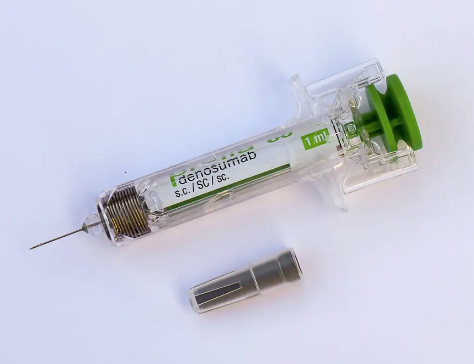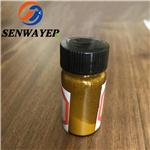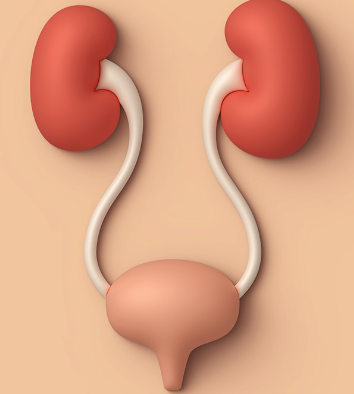What are the pros and cons of taking denosumab?
Introduction
Denosumab is a human monoclonal IgG2 antibody with a chemical structure C6404 H9912 N1724 O2004 S50, comprising 2 heavy and 2 light chains, with each light chain consisting of 215 amino acids and each heavy chain consisting of 448 amino acids with 4 intramolecular disulfides, produced in hamster ovarian cells by recombinant DNA technology.

Denosumab binds and neutralizes the receptor activator of nuclear factor kappa-B (NF-κB) ligand (RANKL) with high affinity and specificity. RANKL is a 316 amino acids (aa) protein, a member of the tumor necrosis factor (TNF) superfamily. RANKL expressed by osteoblasts, principally by osteocytes, is indispensable for the maturation of osteoclast precursors, activation, attachment to bone, and survival of mature osteoclasts. Consequently, denosumab administered subcutaneously (SC) at a dose of 60 mg once every 6 months shows a well-established anti-osteoclastic efficacy, leading to the original approval of denosumab as an antiosteoporotic agent to counteract postmenopausal osteoporosis (2010) and bone loss related to hormonal ablation therapy in breast and prostate cancer patients at high risk for fragility fractures (2011).
Mode of action
In healthy bones, specialized cells constantly break down and replace old tissue. These specialized bone cells are osteoclasts, which break down old bone, and osteoblasts, which build new bone. This process is called bone remodeling and is very well controlled. There is a fine balance between bone breakdown and growth rates, which keeps bones strong and healthy. Denosumab targets a protein called RANKL, which controls the activity of osteoclasts. This stops bone cells from being broken down and strengthens the bone.
Benefits
Denosumab is a type of targeted drug called a monoclonal antibody. It is also known as Prolia and Xgeva. It is a treatment for secondary bone cancer (cancer that has spread to the bones). It helps to strengthen the bones and prevent fractures for some types of cancer. It also helps to slow down bone damage in people who have giant cell tumors of the bone (a noncancerous type of bone tumor). This drug could be used in:
Osteoporosis in females who have gone through menopause
Osteoporosis in males
Osteoporosis caused by certain steroid medications
Bone loss in males taking certain medications for prostate cancer
Bone loss in females taking certain breast cancer medications
Side effects
Common possible side effects include:
Occasional skin infections (cellulitis) at the injection site; back pain; arm and leg pain; urinary tract infections; constipation; rash.
Less common side effects include low blood calcium.
Rarely common side effects include:
Osteonecrosis of the jaw – a condition where healing is incomplete following an invasive dental procedure. An area of bone is exposed through the gum, and a small amount dies. This condition is more common if you have cancer, are having chemotherapy, have severe, recurrent dental infections, and are having dental treatment.
Painful, partial, or complete fractures in the upper, outer region of the thigh bone (femur) below the hip. Partial fractures are usually confirmed by a special diagnostic scan. The risk appears to increase the longer you have been taking these drugs and may be greater if you are also having steroid treatment or have diabetes. However, it is still extremely rare.
Advantages
It can help to reduce your risk of broken bones, including in your hips and spine.
It is given as an injection, which is helpful if tablets are problematic.
You will only have one injection every six months.
It starts to work quickly and is effective for at least 10 years.
Disadvantages
As with all medications, some people get side effects.
There are some possible health risks after several years of use, but these are rare.
The benefits of the drug wear off very quickly if you stop having it.
Some people don't like the idea of injections.
You must visit the hospital or GP every six months for an injection.
References
[1] Maria V Deligiorgi, Dimitrios T Trafalis. “The safety profile of denosumab in oncology beyond the safety of denosumab as an anti-osteoporotic agent: still more to learn.” Expert Opinion on Drug Safety 20 2 (2021): 191–213.
See also
Lastest Price from Denosumab manufacturers

US $0.00-0.00/mg2024-09-25
- CAS:
- 615258-40-7
- Min. Order:
- 1mg
- Purity:
- 99%
- Supply Ability:
- 50kg

US $0.00/kg2024-04-12
- CAS:
- 615258-40-7
- Min. Order:
- 1kg
- Purity:
- 99%
- Supply Ability:
- 2000ton


